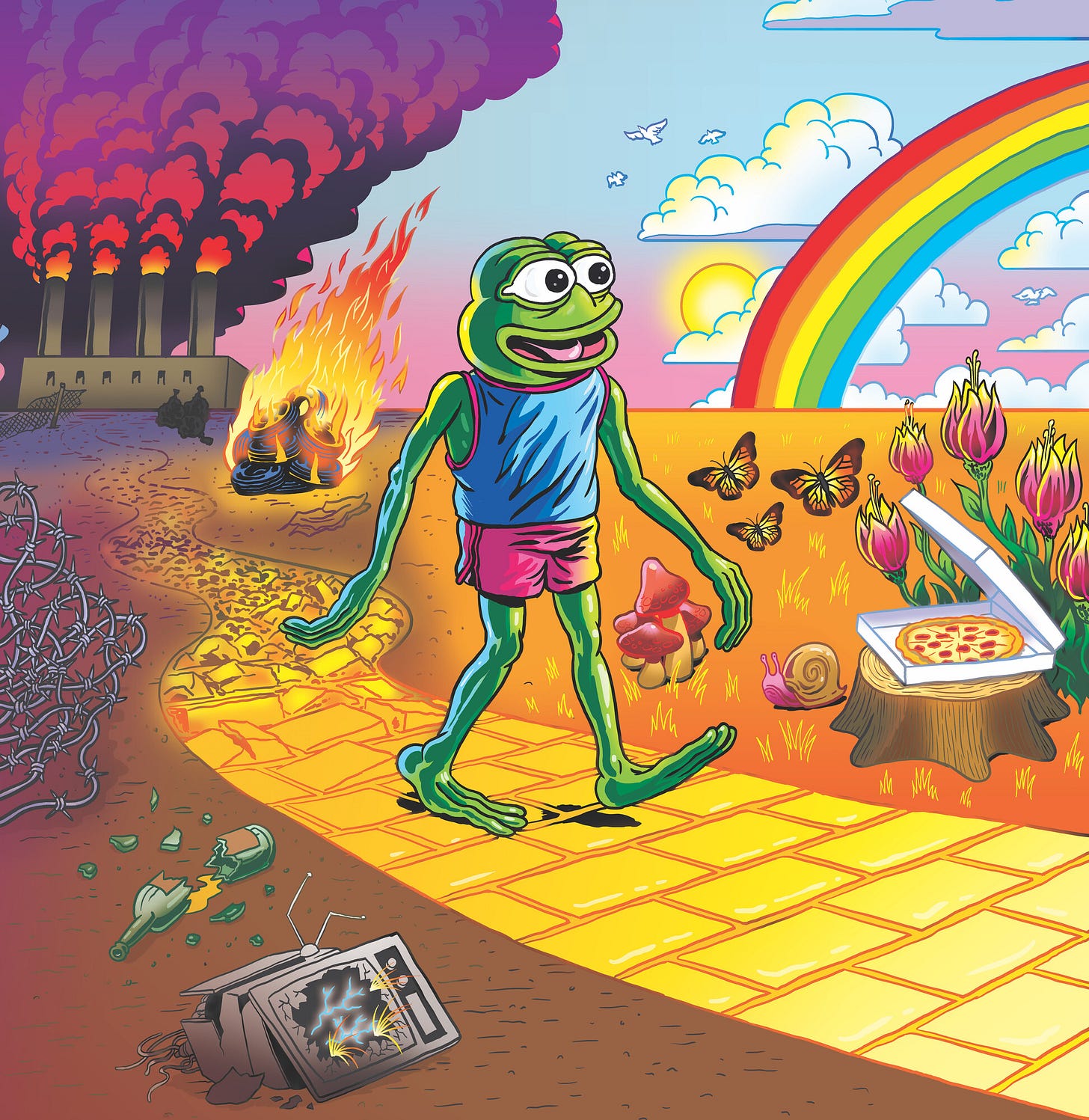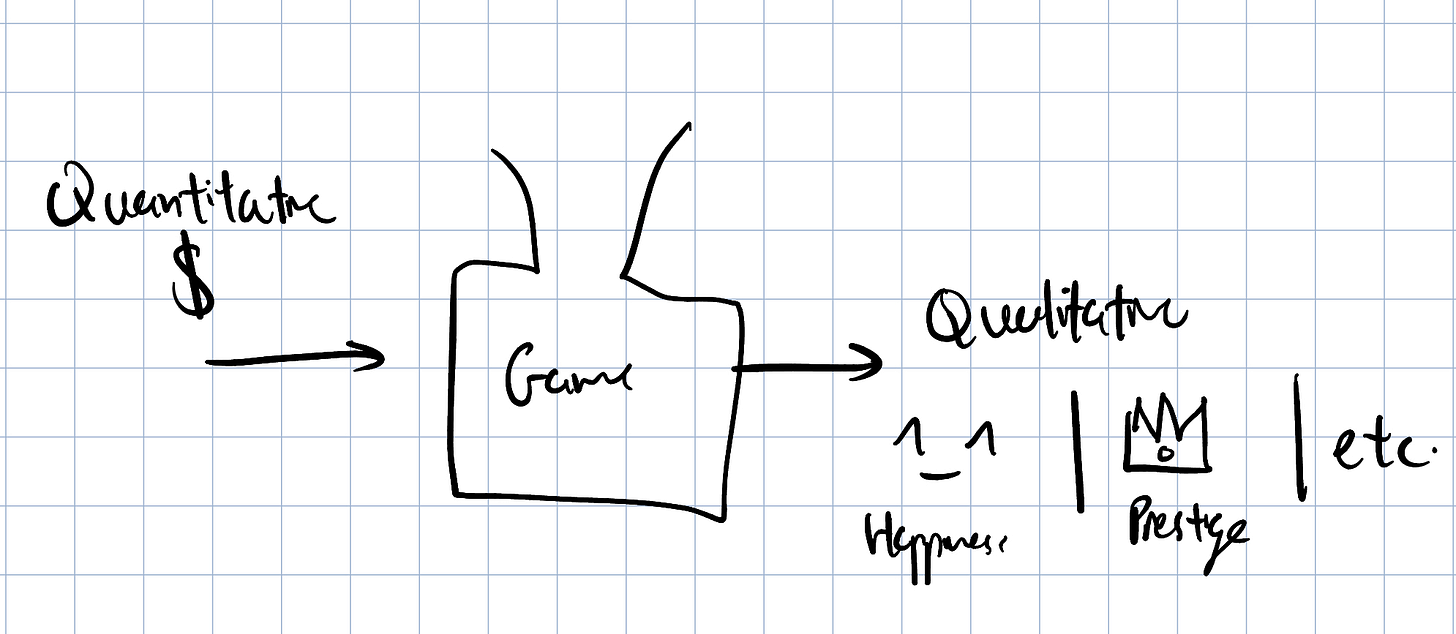Let's Envision The Future Of An Increasingly Tokenized World
Web3 emphasizes on "owning the product" - what does that look like?
The Fundamental Philosophy
The world of crypto always emphasizes the ideology of the “sovereign individual”. The individual that, instead of “being the product”, now owns their rights as a product and can charge people for being used as such. This is, of course, done through smart contracts that help decentralize the whole process of needing a centralized authority.
The simplest way to illustrate this is to say: Creator A uses platform Y to amass an audience. In return for using Y as a platform to disseminate content, creator A sacrifices a portion of his/her revenue to the company.
The issue here is of multiple dimensions, but can simply be boiled down to a few key complaints:
Platform fees are egregiously high + they pretty much have the liberty to do what they want, because the creator is extremely reliant on being on that platform seeing as it’s the dominant platform in the space (like actually, Y has no competitors. A live-streaming platform is similar but different)
Creators henceforth aren’t allowed the actual freedom to produce whatever they want, instead, they have to follow the rules imposed by the platform, despite being the ones that generate actual user activity on the platform (if there were no creators, no one would be on Y)
The cycle is pretty much - creator attracts viewers on Y → Y becomes the ideal platform for viewers to view their creators → Y uses creator to attract more creators → Y gets more creators, earning them more money, allowing them to attract more creators → but now Youtube virtually has monopoly over all other similar platforms and creators → They get to make the rules for the creators because the creators have nowhere else to go.
Isn’t it weird how the tables have turned? Now, let’s look at a Web3 version of this.
Web3 emphasizes the freedom of the individual. In an ideal Web3 world, creator A is on a decentralized platform Z instead, which is run by smart contracts and gives creators more of their revenue. On top of that, platform Z probably has some tokens like $ZDAO that control governance - and this tokenization of governance disallows unilateral decision making. If someone wanted to ban, say, all cat videos, they couldn’t unilaterally do it.
Doesn’t this sound great? Well, yes! Now, this is just one of the many examples of this ability to “Web3-anize” assets, i.e to convert from the older way of doing things to a newer model. I would like to further expound on this idea by just taking you on a journey to envision what an increasingly tokenized world could look like.
“X”-To-Earn
The first stop is the P2E category. This is an idea most people should be familiar with - the ability to earn $ while playing their games. This idea can then be abstracted away from just playing, to everyday activities - for example, walking-to-earn, studying-to-earn, etc.
Well, obviously there has to be some cap to it. For such an economic model to be sustainable, there have to be incentives for users to pour money into the system. After all, the first law of thermodynamics applies to any economic system - Money cannot be created or destroyed, only altered. The money entering a state has to be net equal to the money exiting the state.
But this article isn’t for debating possible economic models. Instead, it’s to pull your attention to how our mundane day to day tasks, if given a strong enough economic incentive, could be “tokenized”. Games are the simplest and more straightforward form of doing this because they so easily turn our quantitative assets like time and money into qualitative factors such as joy.
Playing-2-earn is hence possible with the idea of the “sovereign gamer” - gamers now own their assets fully (say, as a NFT) and can buy/sell them for actual currency. There are many other ways that the “earning” part can come into fruition - RaidParty, for example, allows players to generate $CTFI like an idle game just by owning the hero NFT.
We now have a pretty good idea of how games can be tokenized and gamers can be empowered to earn monetary rewards just by playing - now let’s move on!
Attention-As-A-Token
If I recall correctly, one of my first interactions with this tokenized mechanism was when I installed Brave back in 2020. I didn’t get into crypto till late 2021, mind you. I was just looking for cool browsers and found that I could get paid for watching ads.
While (I hear) that the token didn’t isn’t doing too well, the core idea is something amazing. Getting paid to watch videos is honestly something I believe to be so revolutionary that every day I wonder why there aren’t more people building on this.
In an attention driven economy, the winner is the one who has the deepest pockets - whoever can buy the most influence by paying creators and influencers to promote their assets, or even buy/re-create the platform that everyone uses,
The problem with the current model is that we are obviously the product. Instagram’s business model is mostly ad revenue (who even uses Instagram shops when there’s Amazon); we are the ones that a company is making money off of.
Now, what would a tokenized version of this look like?
Let’s take a look:
In the current model, we have
Users - these people lose their attention and gain nothing in return
The platform - which gains $
The businesses/individuals that seek to gain attention, at the cost of spending money
In a decentralized model, now we have
Users that lose their attention but GAIN MONEY in return
The platform- which gains $
The businesses/individuals that seek to gain attention, at the cost of spending money
Isn’t this beautiful? And who’s to say that these attention-focused platforms need to be centralized in the first place - Instagram’s flagship product is a piece of code, after all.
Now, in a free market, this has no reason why it shouldn’t happen - the users, who give the platform the name in the first place, only stand to gain by switching. But, we shall see - I eagerly await the day that social media gets tokenized.
Freelance-As-A-Service
At this point, we’re all getting used to how the whole “Web3-anize” system works - by replacing some sort of central authority with smart contracts, we can overhaul the way the current system works. So to shorten the length of this article, I’ll stop being elaborating on how they work.
Freelance as a service is another one of those “duh” things that I think should already have been tokenized. Platforms like Fiverr take a humongous 20% of the pay cut of creators - and these platforms can probably be automated.
In return, creators can get more value for their work, plus, certain economic incentives (like a token that airdrops to all freelancers that is allocated based on work done to incentivise work? Sounds great on paper tbh)
All in all, loads of ways this could be done, and loads of benefits for creators as well.
The Creator Economy As A Whole Stands To Gain
Actually, I believe that in general, creatives stand to gain quite a lot from an increasingly tokenized world, because their industry is characterized by loads of freelancing + “free labour” to gain the necessary “exposure” to one day reach critical mass such that they can be paid for their work.
Freelance as a service would probably greatly help their earning powers, and we already have seen how artists can be paid handsomely for NFTs instead of normal art.
Writers can gain hugely by publishing on platforms such as Mirror as well. But perhaps what I’m most excited for are public popstars such as singers, dancers, vloggers, streamers, etc - anyone that creates a “community” for themselves to one day leverage the most out of tokenization.
Imagine an unpopular singer you follow issues an NFT to his/her first 1000 subscribers. It’s a limited edition NFT, and then a few years later he/she becomes huge. The NFT now comes with certain utilities, such as being able to go with the singer to certain places, first star seats at a concert, etc.
The singer gets a cut of all NFTs that are traded (additional revenue stream) and his/her fans are now awarded for being “diamond-hand viewers”. They are awarded for the support they have shown since the very beginning; but currently, there are no such incentives that exist in our world.
This concept is something I’m very excited about - I’m always excited to see my fellow creators (ahem writers) perhaps have better ways to grow their revenue share.
Tokenized Institutions
I believe that Institutions can stand to gain from being tokenized as well - and no, I’m not talking about everyone issuing a token of some sort.
Instead, startup companies that require loads of heavy lifting and infrastructural development at the start could use decentralized job boards that have the advantage of being cheaper for them, and more beneficial for their employees. They could also post up job boards of their own, allowing work to be tokenized in a sense.
This is pretty much currently being done with DAO job boards, which I think is great - but for it to expand to general institutions, I’m sure loads of regulatory work has to be done. But we’ll get there (I hope).
In my honest opinion, I think that this covers most of the largest areas that I believe a tokenized economy could help. If everything I said comes to fruition, we have a future where we earn money by watching ads, could play games to earn money and have a stake in our favourite influencers growth! Doesn’t that sound great?
Or does it?
The Yellow Brick Road Have Demons Beneath
I’ve come to realise that, yes the ideal world we imagine is great, but there’s a reason why it’s called “ideal”.
Honestly, despite how large of a dream that we can possibly achieve with this newfound technology, it is perhaps more likely that they will be used for means that very often contradict what we desire.
For example, I have heard of the idea being thrown around to monitor “all transactions on the blockchain so as to only allow people to buy certain foods”. With a public ledger, all transactions are publicly available for all to see - and in a worst-case scenario where non-custodial wallets are banned, this means that EVERY. SINGLE. TRANSACTION is available to be seen, to be processed as data, and to be used against us.
This is perhaps, the greatest hurdle that we have to overcome in the coming years. With the era of CBDCs inching closer by the minute, I fear for a world where I’m not allowed to spend money on certain things if a certain lifestyle gets banned. And I don’t think we’re that far from this becoming a reality as well.
The technology that pushes us forward can very well be the monster that brings our demise. But only time will tell for what is to come. While I like to always believe in the humanity of every individual, I know better than most how naive that is.
In the end, I will look forward expectantly at what is to come - and I thank you for partaking in this ride on imagining what an ideal world could look like;
P.S. If you made it this far, thanks! Let me know what you thought of it in the comments. See you next time :) Cheers, fren.





